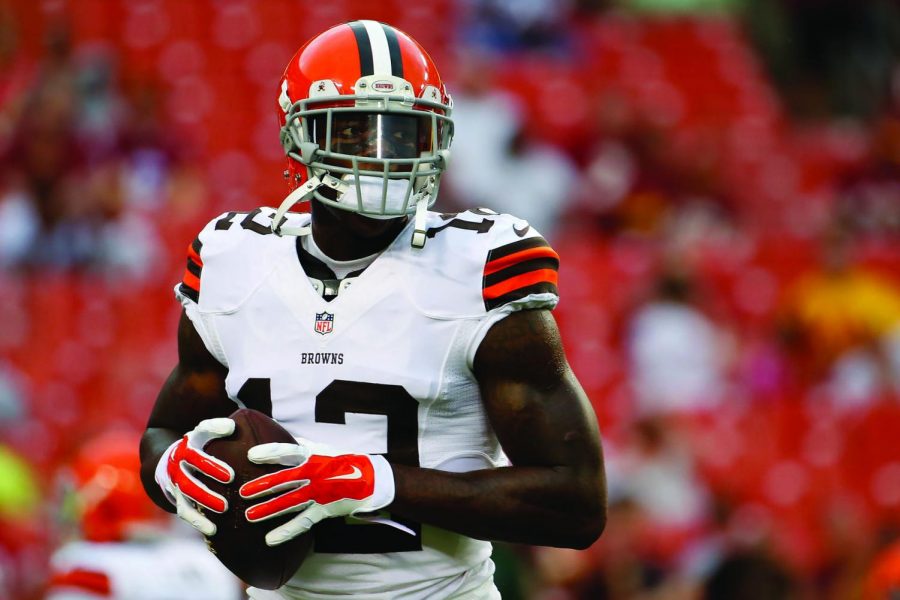NFL, NFLPA agree on new drug policy
September 15, 2014
Last season, Cleveland Browns wide receiver Josh Gordon led the NFL in receiving yards, catching 87 passes for 1,646 yards and 9 touchdowns. This season, after receiving a one-year suspension for violating the NFL’s previous drug policy, it seemed as though Gordon would not see the field this season, but things have changed.
After weeks of negotiation, the NFL and the NFL Players Association agreed on a new drug policy that saw Gordon’s suspension reduced to 10 games. The four-game suspensions of Denver Broncos wide receiver Wes Welker and Dallas Cowboys cornerback Orlando Scandrick have been overturned and both players can return to their teams immediately, according to the NFL website.
Both sides came together on key issues such as reform in marijuana testing, which raises the threshold for a sample to 35ng/ml, as well as reducing suspensions for first-time marijuana offenders to two games, down from four games under the old policy, according to a Sept. 12 NFLPA press release.
In addition to lesser punishments for marijuana use, testing for human growth hormones will begin, effective immediately. However, the collection of blood for HGH testing is prohibited on game days, according to the press release. Under the new policy, Gordon and others would not have failed their drug tests, which has caused speculation among ESPN and other media outlets that players could potentially sue the NFL for lost salary.
Scott Andresen, a Chicago sports law attorney, said that while the players could sue, he does not think they have a strong case because they were punished under the policy that was in place at the time of their violations.
“Let’s say they increase the speed limit from 65 to 70 miles per hour on January 1 [and] I get pulled over at 11:59 p.m. on December 31 driving 70 miles an hour, which at the time was five miles [per hour] over the limit,” Andresen said. “I would get a ticket [because] I violated the law as it existed at that time.”
In March, Lester Grinspoon, a professor of psychiatry at Harvard Medical School and author of the book “Marijuana Reconsidered,” suggested that the NFL look into using marijuana as a possible concussion treatment. Grinspoon said his proposal could potentially help affected players immediately.
“Whatever else [marijuana] does, it’s not going to hurt you,” Grinspoon said. “My proposal is something that could be done right away while the research to confirm it [or disconfirm it] is done.”
Grinspoon also said concussions and head injuries are not going to be solved by equipment changes but that marijuana may be able to help where equipment cannot.
“Helmets do a good job of protecting the skull, but they do very little for its contents—the brain,” Grinspoon said. “Cannabis is [shown to be] neuroprotective.”
NFL Commissioner Roger Goodell said he would not rule out medical marijuana use as a possible treatment for players if more scientific evidence comes to light that it could be helpful, according to a January ESPN report.
Dr. Ed Gogek, an addiction psychiatrist, said he hopes the NFL remains drug-free, new policy or not.
“The pro-marijuana folks are pushing marijuana on everything,” Gogek said. “Unless there is really good research, I don’t buy what they’re saying.”
Grinspoon wrote an open letter to the NFL in which he urged the league to change its drug policy drastically and allow players the freedom to treat their pain how they see fit.
“I would urge the NFL to drop its urine testing marijuana program, so that players who believe that a high ratio CBD/THC substance may be useful to them [for pain or concussions] will be free to use it without objection by the NFL.” Grinspoon said in the letter.
Grinspoon said he was not offended by the NFL’s lack of response because his proposal has been viewed as taboo by many, Harvard included.
“Harvard has been very annoyed with me for doing this,” Grinspoon said. “They don’t want people to know about me.”
The NFL’s new policy, while seemingly less strict on marijuana, still does not give players the right to freely use the drug even if it is legal in the states they play in. While many fans have taken to social media sites like Twitter to speak in favor of this move, there has also been some backlash toward Goodell for not allowing players to recreationally use marijuana, even if it is legal in the states they play in.
Gogek said the NFL needs to remember that its players are role models to young people.
“Historically, one of the events that really changed drug use in this country was the death of [college basketball star] Len Bias,” Gogek said. “After he died, cocaine use in this country dropped by two-thirds. People really pay attention to what athletes do, and that’s what the marijuana lobby wants— they want the NFL to use it so they can say that athletes are using it too.”








